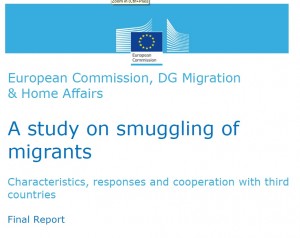
Click click here to see the full report
In November 2015, the European Commission published a study on smuggling of migrants, carried out by ECRE, in a consortium with Optimity Advisors and the International Centre for Migration Policy Development (ICMPD). The study gives an overview of patterns and trends of the phenomenon. It also analyses and assesses existing policies of selected EU Member States and third countries.
The study concludes that policies and operational measures only targeting human smugglers, such as law enforcement activities on border management and migration control, could perversely result in higher risks for migrants and increased costs to them. For instance, when migrants run out of money at any point along the route, they can easily become victims of human trafficking, including abuses, extortions and kidnappings. Nevertheless, stricter enforcement policies might only result in diverting the routes, as migrants are relatively unresponsive to the price paid for the crossing or the risks they might face along the journey.
Furthermore, regarding national legislation, the study also shows that most of the EU Member States do not clarify whether a person who assists migrants in crossing the border irregularly for humanitarian reasons should be sanctioned or not, according to the EU Directive. Conversely, as stressed by the EU Fundamental Rights Agency and several NGOs, the penalty for providing humanitarian assistance results in the criminalisation of migrants and refugees for irregular entry and for organisations assisting them. Civil society has raised concerns about the criminalisation of migrants and the criminalisation of humanitarian assistance to migrants in relation to the Facilitators Package legislation, which is now under review. There are actually stronger humanitarian elements in the United Nations Protocol against Smuggling which could be used, namely by criminalising acts committed only for financial gain and inserting specific clauses to avoid the criminalisation of individuals or organisations acting for humanitarian purpose.
The study draws attention to the constantly changing routes, as well as the flexibility and resilience of the smuggling networks. Consequent to these findings, migrants and refugees are exposed to different risks and are required to pay varying prices according to the route they choose; changes in costs that may occur even when taking the same route. Moreover, migrants and refugees usually organise only the first stage of their journey, and need to take spontaneous decisions en-route, that may require yet more changes in their direction of travel.
In conclusion, national and European governments should enhance their cooperation in order to adopt comprehensive measures, targeting smuggling networks and Hubs, as well as addressing the reasons that force migrants to rely on these criminals, such as the absence of legal channels to Europe. International organisations should assist and monitor countries’ approaches with regards to respecting and protecting the rights of smuggled migrants.

